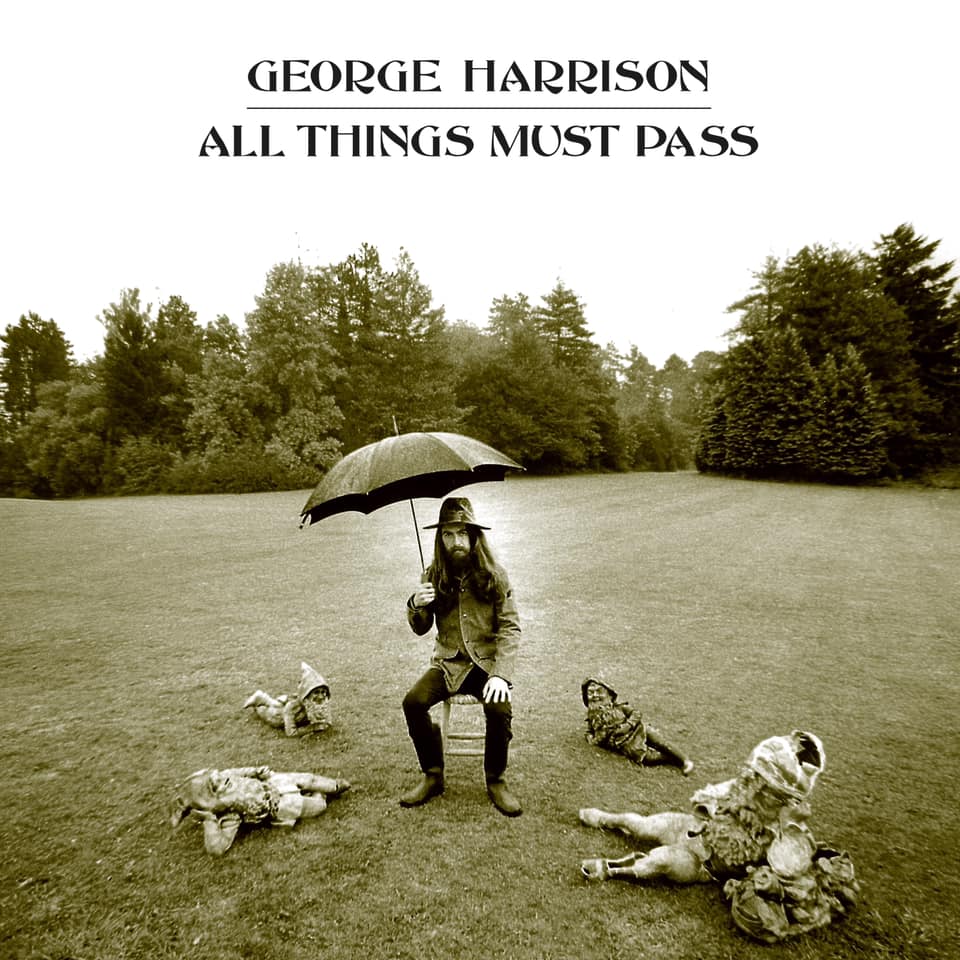
Music contributor Zara Flack honours the legacy of George Harrison’s essential debut solo album
‘Quiet Beatle’ George Harrison appears towered over four gnomes on the front of his (self-proclaimed) first solo album All Things Must Pass, representing his distance from the group that catapulted him to stardom. As a Beatles fanatic (as many of us are), it is unsurprising that I am mesmerised by Harrison’s shift from a commercialised image within The Fab Four to a spokesman of serene spirituality. Released in November 1970, the folk-rock album is commonly labelled as the greatest solo Beatles album recorded, with a spiritual and utopian drive behind it. In the backdrop of the travesties of The Vietnam War, this drive spoke to the masses. Harrison’s spiritually charged lyricism and gospel-rock genre called people to ‘look for the light […], the light within’.
It is undeniable that every song on this album has a purpose behind it. ‘Beware of Darkness’, ‘Awaiting On You All’, and the title track ‘All Things Must Pass’ all exhibit a similar message of religious devotion. Promising ‘free[dom]’ if one ‘chant[s] the names of the Lord’, Harrison blatantly displays the album’s key message of holy actuality. ‘My Sweet Lord’, with over half a billion Spotify listens, presents itself as a spiritual gospel song combined with the Hindu bhajan tradition.
It is undeniable that every song on this album has a purpose behind it.
Harrison’s contributions to The Beatles with ‘Here Comes The Sun’ and ‘Something’ not only demonstrated his lyrical talents comparable to Lennon and McCartney. They also have irrefutable themes of devotion to a higher power, love for a woman and love for the environment, all under the umbrella of the songwriter’s general love for his ‘Sweet Lord’. All Things Must Pass is where Harrison takes these sprinklings of spiritualism and expands them exceedingly in the form of a triple album.
Developing an individual identity is the core message of the album. George Harrison and Paul McCartney had become bitter towards one another during the Get Back sessions and their friendship had clearly begun to disintegrate as they moved to new projects. Harrison’s personal friendship with The King of Folk influenced All Things Must Pass greatly. His admiration for Bob Dylan shines through with songs such as ‘I’d Have You Anytime’, and a cover of ‘If Not For You’. George Harrison’s newly developed solo image coincided with Bob Dylan’s comeback to the media after three years of seclusion. The country-folk ballad ‘Behind That Locked Door’ exhibits itself as a track of support for Dylan. This friendship persisted until Harrison’s death in 2001, with the two forming the supergroup Traveling Wilburys in 1988 along with Jeff Lynne, Roy Orbison, and Tom Petty.
George Harrison’s All Things Must Pass is … a tribute to new beginnings.
‘Wah Wah’ serves as a ‘simple, spiritual sentiment’ within its lyricism – ‘And I know how sweet life can be / If I keep myself free’. This track directly represents Harrison’s irritation before the final fall of The Beatles; his songs for the band were commonly ignored in favour of the crafts of McCartney/Lennon. The song was written the same day Harrison stormed out of one of the Get Back sessions. It is an allusion to his appreciation for the wah-wah guitar pedal as well as the ‘headache’ that the band was starting to inflict on him.
George Harrison’s All Things Must Pass is an insight into the workings of The Beatles but, more significantly, a tribute to new beginnings. The album is sophisticated, raw, and alluring. From ‘My Sweet Lord’s’ potent chant of devotion to ‘Apple Scruffs’s’ call to Beatlemania, the record offers the listener a new revelation each and every interaction.
You might also like:
Essential Single: Led Zeppelin – Babe I’m Gonna Leave You/Dazed and Confused
Comments